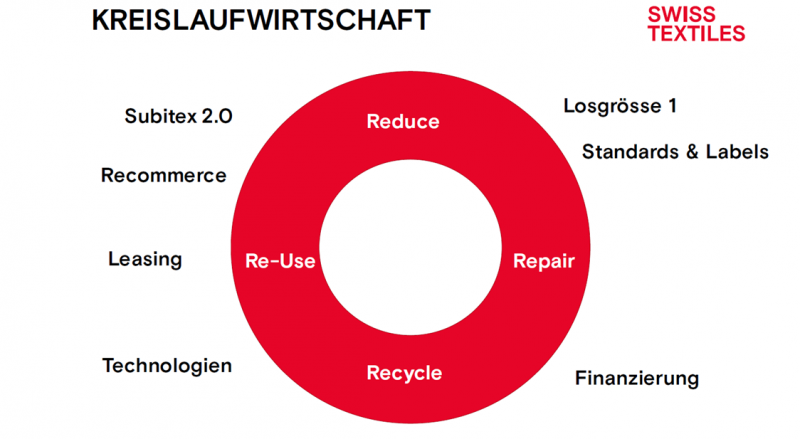Sustainability
The circular economy has become an important part of EU and Swiss policy

The Sustainability Group of Euratex, the European umbrella association of the textile and garments industry, met in Switzerland for an exchange of views on 24 and 25 March. Organised by Swiss Textiles, just under 35 participants from 28 countries came together to discuss the latest developments in the area of sustainability rules in the EU.

Nina Bachmann
Swiss Textiles
Sustainability, Member of the management board
Nina Bachmann gives an insight into topics on the European policy agenda and the specific projects that await Switzerland in coming months.
What main topics are being discussed by the Euratex Sustainable Group at present?
We dedicated the whole of the first day to the new EU regulatory provisions on the circular economy. With the “EU Textile Strategy” as part of its "Sustainable Product Initiative", the EU wishes to ensure that products sold on the EU market become part of the circular economy in future. That sounds fine of course – but looking at the details comprehensive regulations are still required; in their present wording they will revolutionize the entire EU industry and its supply chain. Along with rules on design, material composition, long life etc. the EU also wants to regulate the provision of information about the supply chain so that consumers and recyclers know exactly what a product contains. In particular, many questions about the “Digital Product Passport” remain unanswered. For instance, how can all the data that are currently only available at company level, such as energy and water consumption, be extrapolated down to individual products? And what exactly is a product? Are yarn, labels, buttons on a pair of trousers already products, each of which needs a separate passport, or are the trousers as such the only product?
How will this be implemented by SMEs?
Based on a proposal by the representative of Finland, we discussed fundamental principles of positioning by means of which Euratex can represent the interests of the textile industry in dealings with the EU authorities.
The second day went on to focus on the REACH chemical regulations – an unpopular ongoing topic for many years. A growing number of chemicals are being placed on the “list of potentially hazardous substances” by the EU, so confronting businesses that manufacture in Europe with serious and in part insoluble challenges – especially as imports are not being effectively supervised. Here the participants showed growing resignation and frustration, especially those who make high tech textiles at their European sites. Or, as one participant, referring to the new proposed regulations, put it ironically: “For the EU authorities, every chemical substance may be of concern – even H20 – water”.
As a matter of principle, Switzerland sets greater store by companies’ own responsibility and does not regulate everything down to the last detail, as is increasingly the case in the EU.
Does Switzerland agree on everything or are there differences?
There are some differences. Less on the topics themselves and more on implementation. As a matter of principle, Switzerland sets greater store by companies’ own responsibility and does not regulate everything down to the last detail, as is increasingly the case in the EU. However, given the importance of the EU market, Switzerland must endeavour to follow EU regulations so as to avoid barriers to trade. That is why a very close watch is being kept on the EU’s main regulatory provisions and equivalent regulations are often also adopted in Switzerland.
The circular economy has become an important issue for the administration and political circles in Switzerland as elsewhere. A hearing was recently held on the basis of a parliamentary initiative. Changes to the Environmental Protection Act are being discussed. What exactly does this involve?
Parliamentary Initiative 20.433 is the outcome of many proposals laid before Parliament. The Environmental Protection Act (EPA) is to lay the foundation for material cycles. For instance, it should be possible to permit time-limited departures from the provisions of the EPA for innovative pilot projects and the statutory basis is to be laid down for recycling charge systems going beyond the electronic articles sector.
Keyword: recycling charge. Some EU Member States already impose this charge for textiles. What is being planned in Switzerland?
As yet, there are no concrete plans for textiles in Switzerland. However, we have already been discussing with our members the shape that a textile recycling levy scheme might take. What aims would have to be achieved? For what funding purposes would the revenue be deployed? How will such a system be organised? We gathered the first ideas at a workshop on 31 March with the help of Swiss Recycling, together with just under 30 companies. We will now be working up these ideas. This may lead on to a small pilot project in which we will test the “textile cycle” ecosystem from the financing and other angles.
We are already discussing the potential shape of a textile recycling levy scheme with our members.
You act as a link between companies, administration and politicians. How do you put the companies’ wishes to the administration and Parliament and how can companies have their say?
The most successful pathway for us is to put the companies’ wishes to the administration already at an early stage of the political process, i.e. even before a bill is drafted. But we are also active at the later stages of this political process by making contact with members of Parliament or joining forces with other associations and presenting a written position statement. Companies talk to us through our specialist groups – on policy matters, the economic policy and sustainability groups play a key role and therefore often work together. We take up the companies’ concerns and our business office goes on to adopt a position on that basis. We attach particular value to practical examples – because the articles of a law are often very abstract, but if companies can describe the impact on their daily activities that makes it easier for the administration and Parliament to understand our position.
How does Swiss Textiles regard the definition of criteria for the circular economy by State regulation?
Swiss Textiles is aware that regulation can sometimes play a supporting role. Especially when harmonization helps at the same time to simplify the SMEs’ sustainability management processes. From the point of view of innovation in particular, it is vitally important for regulations to reflect the endeavour to achieve circularity and escape linear thinking. Waste is not always waste – it can also be the raw material for new products – with a corresponding impact on waste charges and customs duties. That must be taken into account. The draft text of the revised Environmental Protection Act points in the right direction, but we would like to see some changes on matters of detail. Our opinion on Pa.Iv. 20.433 can be consulted here.
How does Swiss Textiles view the circular economy?
In the context of STS 2030 we want to help our members to establish a circular economy in the textile sector. We are doing so at present with many individual projects all of which are, however, guided by circular economic principles. I regard these individual products as the pieces of a jigsaw puzzle – which are to contribute new knowledge in the course of the next few years and will then be put together to gain an overall picture.

more information

Nina Bachmann
Sustainability, Technology, Member of the management board
T: +41 44 289 79 02
nina.bachmann@swisstextiles.ch